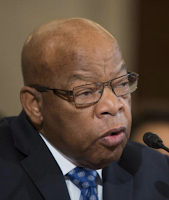 |
| John Lewis |
Lewis is a hero of the civil rights movement, having put his life on the line for civil rights in the sixties -- leading a march in Selma, Alabama where he was beaten and suffered a fractured skull. The New Yorker calls him "the singular conscience of Capitol Hill." John McCain once called Lewis 'one of the most respected men in America.' The Washington Post writes: "For a lifetime of civil rights work, Lewis was awarded the Presidential Medal of Freedom in 2011. Last year, the Navy announced it would name a ship after him, making Lewis one of just a few to get that honor." (Links: "JOHN LEWIS, DONALD TRUMP, AND THE MEANING OF LEGITIMACY" and "In feud with John Lewis, Donald Trump attacked ‘one of the most respected people in America’")
Lewis's refusal to attend the inauguration is an act of patriotism and heroism. Paul Krugman, in his column today, puts this in perspective, saying "talking frankly about how Mr. Trump gained power isn’t just about truth-telling. It may also help to limit that power." Here are a few of the paragraphs from the column:
"...let’s ask whether Mr. Lewis was right to say what he said. Is it O.K., morally and politically, to declare the man about to move into the White House illegitimate?
Yes, it is. In fact, it’s an act of patriotism.
"By any reasonable standard, the 2016 election was deeply tainted. It wasn’t just the effects of Russian intervention on Mr. Trump’s behalf; Hillary Clinton would almost surely have won if the F.B.I. hadn’t conveyed the false impression that it had damaging new information about her, just days before the vote. This was grotesque, delegitimizing malfeasance, especially in contrast with the agency’s refusal to discuss the Russia connection.
"Was there even more to it? Did the Trump campaign actively coordinate with a foreign power? Did a cabal within the F.B.I. deliberately slow-walk investigations into that possibility? Are the lurid tales about adventures in Moscow true? We don’t know, although Mr. Trump’s creepy obsequiousness to Vladimir Putin makes it hard to dismiss these allegations. Even given what we do know, however, no previous U.S. president-elect has had less right to the title. So why shouldn’t we question his legitimacy? ...
"What this means is that Mr. Trump must not be treated with personal deference simply because of the position he has managed to seize. He must not be granted the use of the White House as a bully pulpit. He must not be allowed to cloak himself in the majesty of office. Given what we know about this guy’s character, it’s all too clear that granting him unearned respect will just empower him to behave badly.
"And reminding people how he got where he is will be an important tool in preventing him from gaining respect he doesn’t deserve. Remember, saying that the election was tainted isn’t a smear or a wild conspiracy theory; it’s simply the truth....
"So let’s be thankful that John Lewis had the courage to speak out. It was the patriotic, heroic thing to do. And America needs that kind of heroism, now more than ever."The New Yorker writer, David Remnick, concludes:
"Trump avoided the draft by citing bone spurs in his feet. He has said he has made 'a lot of sacrifices' for his country because he has created jobs and 'built great structures.' The sacrifices that Lewis has made for his country and for the cause of justice are manifest in the scars on his skull. It is a safe bet that he will not be wounded by any tweet. And there are those who know well what he has done to advance the cause of justice and human rights. Eight years ago, at a lunch following the inaugural ceremonies, the new President signed a piece of paper for him with the inscription 'Because of you, John. Barack Obama.' John Lewis surely believes in the orderly transfer of power as a tenet of democracy, but asking him to keep quiet and sit through the inaugural ceremonies this time is asking too much."
No comments:
Post a Comment